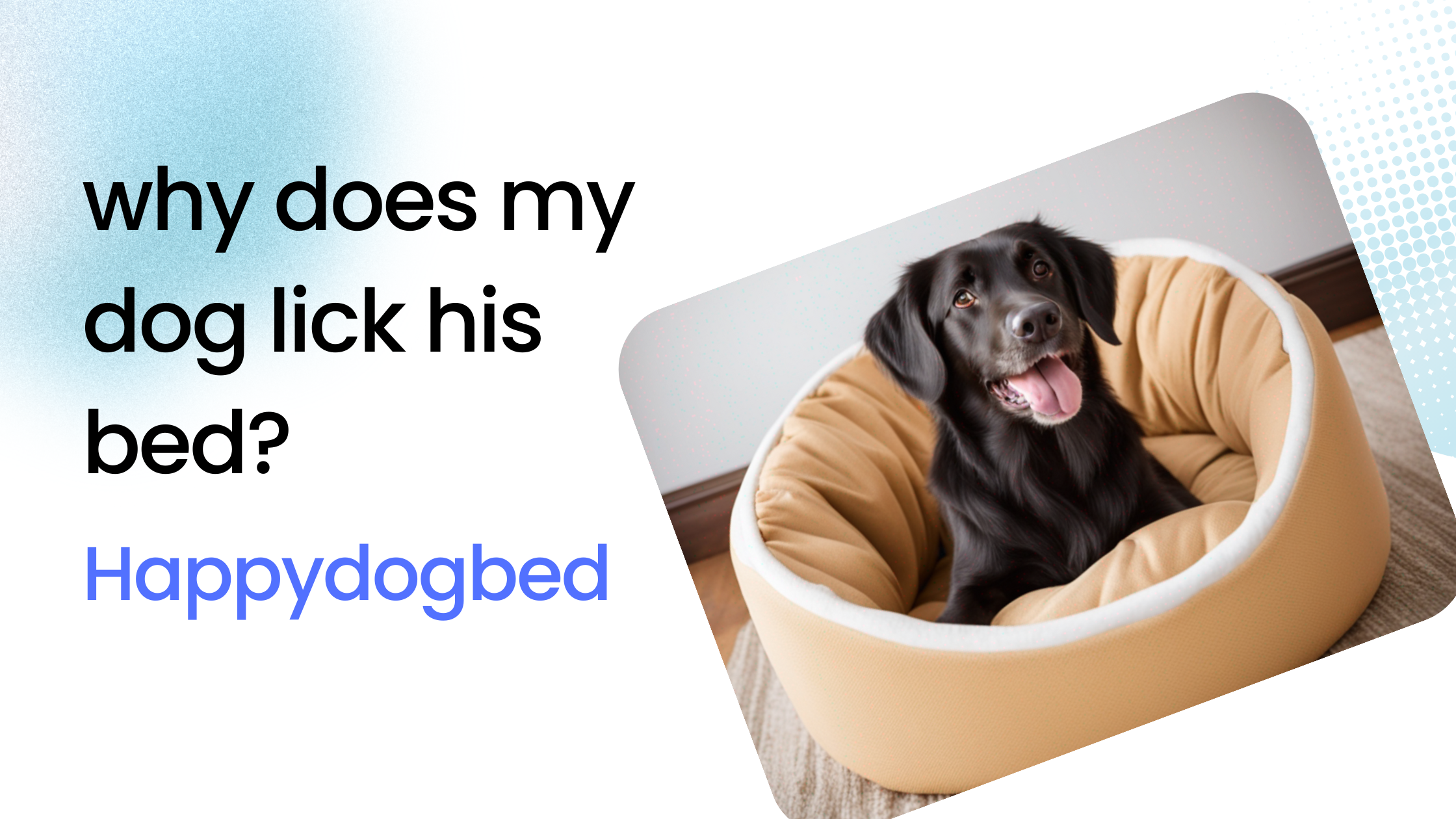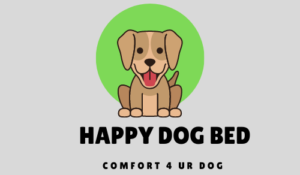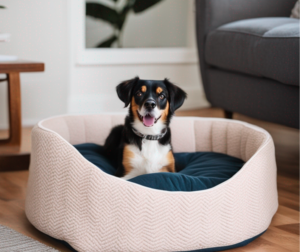
If you ever wonder why does my dog lick his bed? So, The behavior of dogs licking their beds can be both perplexing and concerning for pet owners, prompting a natural curiosity about the reasons behind this peculiar habit. Exploring the potential motivations behind this behavior offers an opportunity to gain deeper insights into our canine companions’ well-being and emotional state.
By shedding light on this intriguing aspect of canine behavior, we can address any underlying issues that may be contributing to this habit, ultimately fostering a nurturing environment for our beloved pets. The act of licking their bed may indeed serve as a coping mechanism for dogs, possibly stemming from a need for self-soothing or comfort in response to stress, anxiety, or unfamiliar surroundings.
By unraveling the root cause of this behavior, pet owners can adopt a more informed and compassionate approach to meeting their dogs’ emotional and physical needs. This understanding allows for the implementation of proactive measures aimed at ensuring the well-being and contentment of our cherished furry friends, promoting a harmonious and fulfilling relationship between pet and owner.
5 Reasons why does my dog lick his bed:
Stress and Anxiety:
When a dog exhibits a habit of licking its bed, stress, and anxiety may serve as significant contributing factors to this behavior. Identifying the root cause of their emotional distress is paramount, and taking proactive measures to alleviate it is essential. Establishing a secure and comfortable environment for your dog, implementing calming techniques such as playing soothing music or using aromatherapy, and seeking professional guidance from a veterinarian or animal behavior specialist are all viable approaches to effectively addressing this issue.
Understanding the impact of stress and anxiety on your dog’s behavior can guide you in creating a supportive and nurturing space for them. Pinpointing the triggers of their unease and actively working to alleviate their stress can greatly improve their overall well-being. By fostering a calming environment and seeking expert advice, pet owners can play a crucial role in helping their dogs cope with stress and anxiety, ultimately promoting a happier and healthier life for their cherished companions.
Boredom and Lack of Stimulation:
When dogs lack sufficient mental and physical stimulation, they may resort to repetitive behaviors like licking their bed. Ensuring that your dog receives ample exercise, playtime, and access to interactive toys is essential to keep them mentally engaged and fulfilled. Engaging in activities such as obedience training and agility courses can provide a holistic approach to stimulating your dog both mentally and physically, contributing to their overall well-being.
By proactively providing mental and physical enrichment for your dog, you can help prevent the development of repetitive behaviors stemming from boredom or under-stimulation. Regular exercise, interactive play sessions, and the introduction of stimulating toys are key components in promoting your dog’s mental engagement and preventing the manifestation of unwanted habits like bed licking. Additionally, incorporating structured activities such as obedience training and agility courses not only provides vital mental and physical exercise but also strengthens the bond between you and your canine companion.
Prioritizing your dog’s mental and physical well-being through adequate exercise, engaging playtime, and stimulating activities serves as an investment in their overall health and happiness. By recognizing the importance of mental stimulation and implementing diverse activities, pet owners can create an enriching environment that supports their dogs’ behavioral and emotional needs, fostering a fulfilling and balanced lifestyle for their beloved pets.
Scent Marking:
The instinct to mark their territory with scent is deeply ingrained in dogs, leading them to engage in behaviors such as licking objects and surfaces within their environment. When a dog consistently licks their bed in a territorial manner, it may indicate a strong need to establish their scent and ownership within that space. In such cases, considering spaying or neutering your dog can be an effective strategy to mitigate this behavior. Spaying or neutering can help reduce the hormonal drive behind territorial marking, potentially lessening the frequency of bed licking and promoting a more harmonious living environment for both the dog and its owners.
Territorial bed licking in dogs can pose challenges for pet owners seeking to maintain a clean and hygienic living space. By addressing this behavior through spaying or neutering, pet owners can take proactive steps to manage their dog’s territorial instincts and promote a more balanced and contented demeanor in their furry companion. While spaying or neutering is not a guaranteed solution for all cases of territorial bed licking, it can play a significant role in modulating the underlying drives that lead to such behavior, contributing to a more harmonious coexistence between dogs and their human households.
Pet owners need to approach the decision to spay or neuter their dog with careful consideration and consultation with a veterinarian. This step can have broader benefits beyond addressing territorial bed licking, including population control, reducing the risk of certain health issues, and potentially curbing other unwanted behavioral patterns. Consulting with a professional can provide valuable insights into the potential impact of spaying or neutering on a dog’s territorial behavior and overall well-being.
Medical Issues:
Why does my dog lick his bed? So, Excessive licking in dogs can serve as a potential indicator of underlying medical issues, prompting the need for vigilant observation by pet owners. Monitoring your dog’s behavior and being attentive to any unusual symptoms is crucial in identifying potential health concerns. If excessive licking persists or is accompanied by other worrisome signs, such as changes in appetite, lethargy, or skin abnormalities, seeking prompt veterinary consultation is imperative. Early detection and treatment of medical problems not only alleviate discomfort for the dog but also contribute to enhancing their overall health and well-being.
A proactive approach to addressing excessive licking in dogs involves regular health assessments and open communication with a trusted veterinarian. By promptly addressing any concerning behaviors and seeking professional guidance, pet owners can play a pivotal role in safeguarding their dog’s health. Veterinarians are equipped to conduct thorough examinations, diagnostic tests, and provide tailored treatment plans that target the root causes of excessive licking, ensuring that any underlying medical issues are addressed comprehensively. This collaborative effort between pet owners and veterinary professionals is instrumental in promoting the long-term health and vitality of canine companions.
Understanding the potential link between excessive licking and underlying medical problems underscores the importance of proactive healthcare for dogs. From routine wellness check-ups to addressing specific concerns related to licking behavior, prioritizing the early detection and treatment of medical issues is a cornerstone of responsible pet ownership. By remaining vigilant and responsive to changes in their dog’s behavior, pet owners can help mitigate potential health risks and foster a thriving and joyful life for their beloved canine companions.
Hunger or Food-Related Behavior:
Addressing a dog’s habit of licking their bed as a sign of hunger or food-seeking behavior necessitates a proactive approach centered around structured feeding practices. By implementing a consistent feeding schedule and providing a nutritionally balanced diet, pet owners can help mitigate the likelihood of their dog resorting to bed licking to communicate its dietary needs. Avoiding the practice of leaving food readily available throughout the day is pivotal, as it not only supports the establishment of a regular feeding routine but also mitigates behavioral concerns like overeating and resource guarding, fostering positive eating behaviors in the dog.
Establishing a feeding schedule tailored to the dog’s nutritional requirements promotes a healthy eating pattern and diminishes the incentive for bed-related behaviors associated with hunger cues. Furthermore, ensuring that treats and chews are dispensed thoughtfully, rather than being stored in the dog’s bed, can help reshape the dog’s perception of its resting area, establishing it as a space distinct from food-related activities. This comprehensive approach emphasizes responsible feeding practices, nurturing a harmonious environment while addressing the underlying motivations behind the dog’s bed-licking behavior.
Conclusion:
In conclusion, there are various reasons why does my dog lick his bed? It could be due to stress and anxiety, boredom and lack of stimulation, scent marking, medical issues, or hunger/food-related behavior. Observing your dog’s behavior and addressing any underlying issues can help reduce this habit and promote their overall well-being. Remember to always seek professional help if you have any concerns about your dog’s behavior or health. So, be attentive and make sure your furry friend is happy and healthy!
As pet owners, it’s our responsibility to understand and address our dog’s behaviors and needs, ensuring they live a happy and fulfilling life by our side. With patience, love, and proper care, we can help our dogs overcome any habits that may be causing them discomfort or harm. Let’s continue to learn and grow with our furry companions, creating a strong and loving bond that lasts a lifetime. So, the next time you see your dog licking their bed, don’t worry, take a moment to evaluate the possible reasons behind their behavior and work towards finding a solution together. Remember, a happy dog equals a happy owner! Keep enjoying your furry friend’s company and cherish every moment you spend together.
FAQS:
Why does my dog lick his bed in his sleep?
Just like humans, dogs can dream while sleeping. Licking behaviors during sleep may be a result of dreaming about food or their favorite treats. It can also be a self-soothing behavior to reduce stress or anxiety.
Is excessive licking harmful to my dog?
Excessive licking can lead to skin irritation and other medical issues if not addressed. If you notice your dog excessively licking, it’s important to consult with a veterinarian to rule out any underlying medical conditions and address the behavior. It may also be helpful to redirect your dog’s attention from licking by providing alternative activities or toys.
How do I get my dog to stop licking the bed?
The first step is to identify the reason behind your dog’s licking behavior. If it’s due to stress or anxiety, work on reducing their triggers and providing a safe and comfortable space for them. If it’s due to boredom or lack of stimulation, try engaging them in mental and physical activities. For scent marking, consider spaying or neutering your dog. If medical
Why does my dog lick his bed and everything nonstop?
Excessive licking can be a sign of medical issues or underlying behavioral problems. It’s important to monitor your dog’s behavior and consult with a veterinarian if you notice any concerning symptoms. Addressing the root cause will help reduce this behavior and ensure your dog’s overall well-being.
How do I know if my dog is stressed or anxious?
Signs of stress and anxiety in dogs can include excessive panting, pacing, trembling, and destructive behaviors. Each dog may exhibit different signs, so it’s important to pay attention to your individual dog’s behavior and consult with a professional if you have any concerns. Creating a calm and safe environment for your dog can also help reduce their stress and anxiety levels.
What is dog pica disorder?
Dog pica disorder is a condition where dogs have a persistent craving to eat non-food items, such as rocks, plastic, or their feces. If you suspect your dog may have this disorder, it’s important to consult with a veterinarian immediately as it can be harmful to their health. Behavioral therapy and proper management can help address this disorder. So, always keep an eye on your dog’s behavior and consult with a professional if you notice any concerning symptoms.
This content is for educational purposes only and should not be used as a substitute for professional veterinary advice. If you have any concerns about your dog’s behavior or health, please consult with a veterinarian. End of Document. Just kidding, there’s always more to learn about pet care and behaviors. Keep researching and stay informed for your beloved furry companion’s sake!




